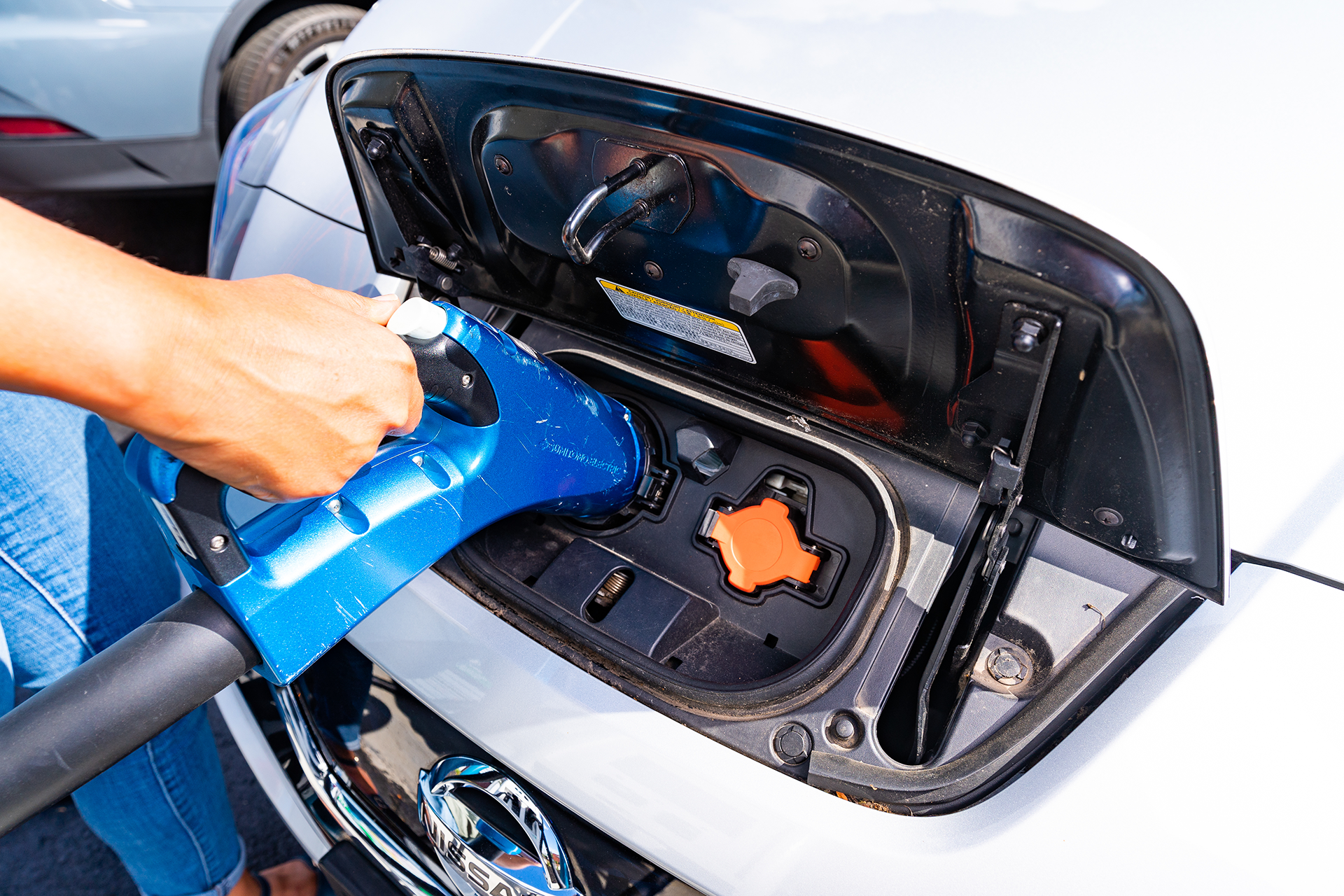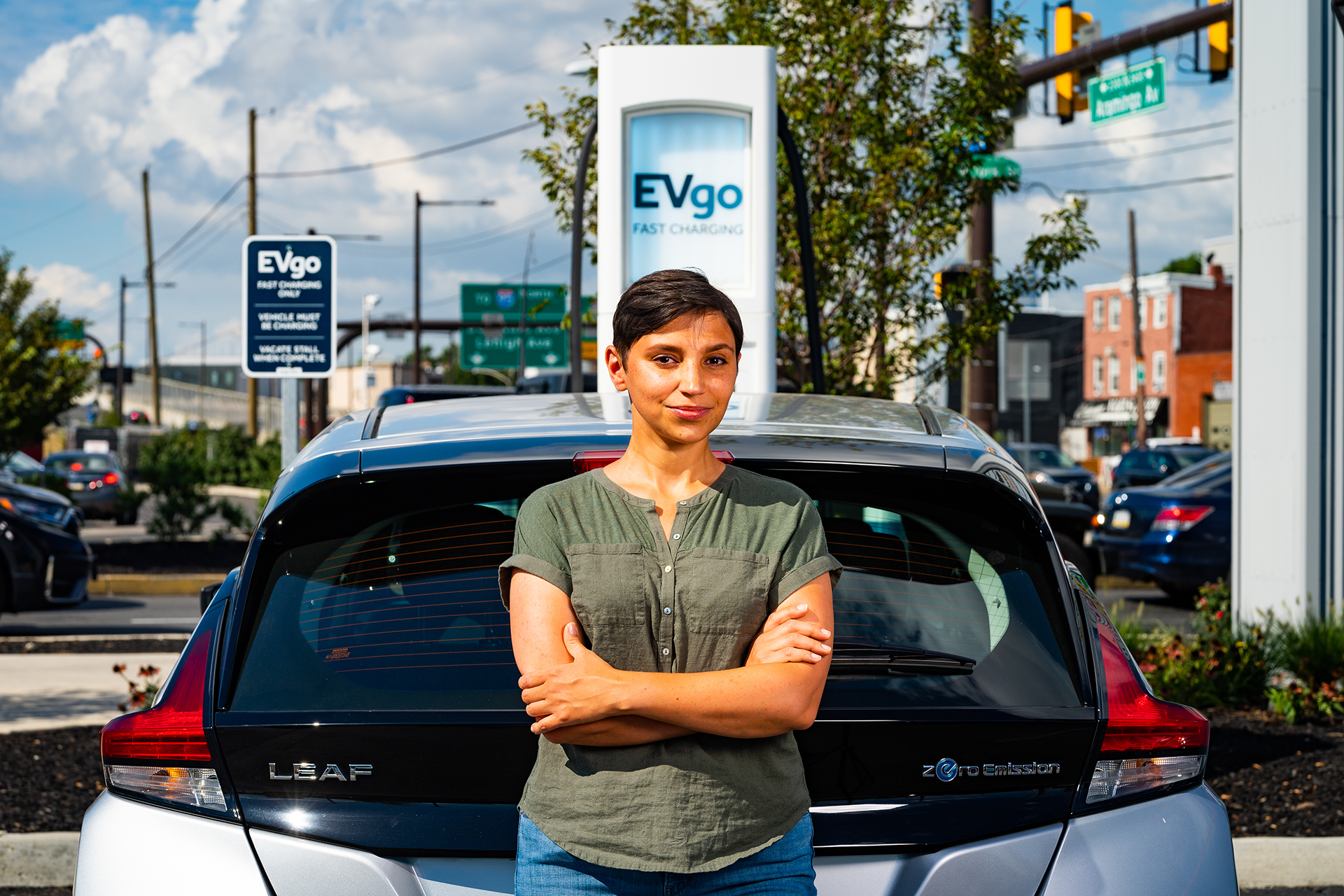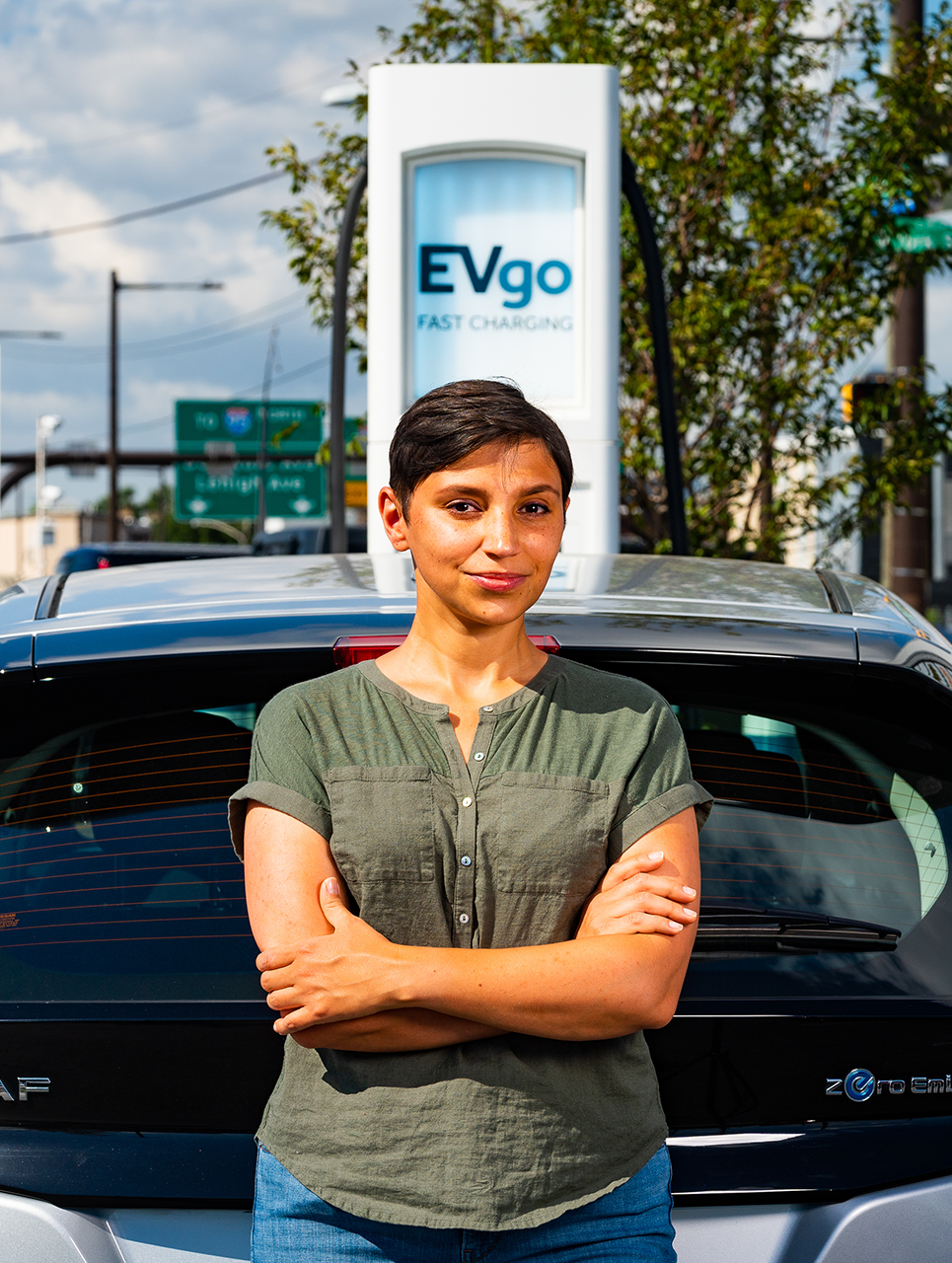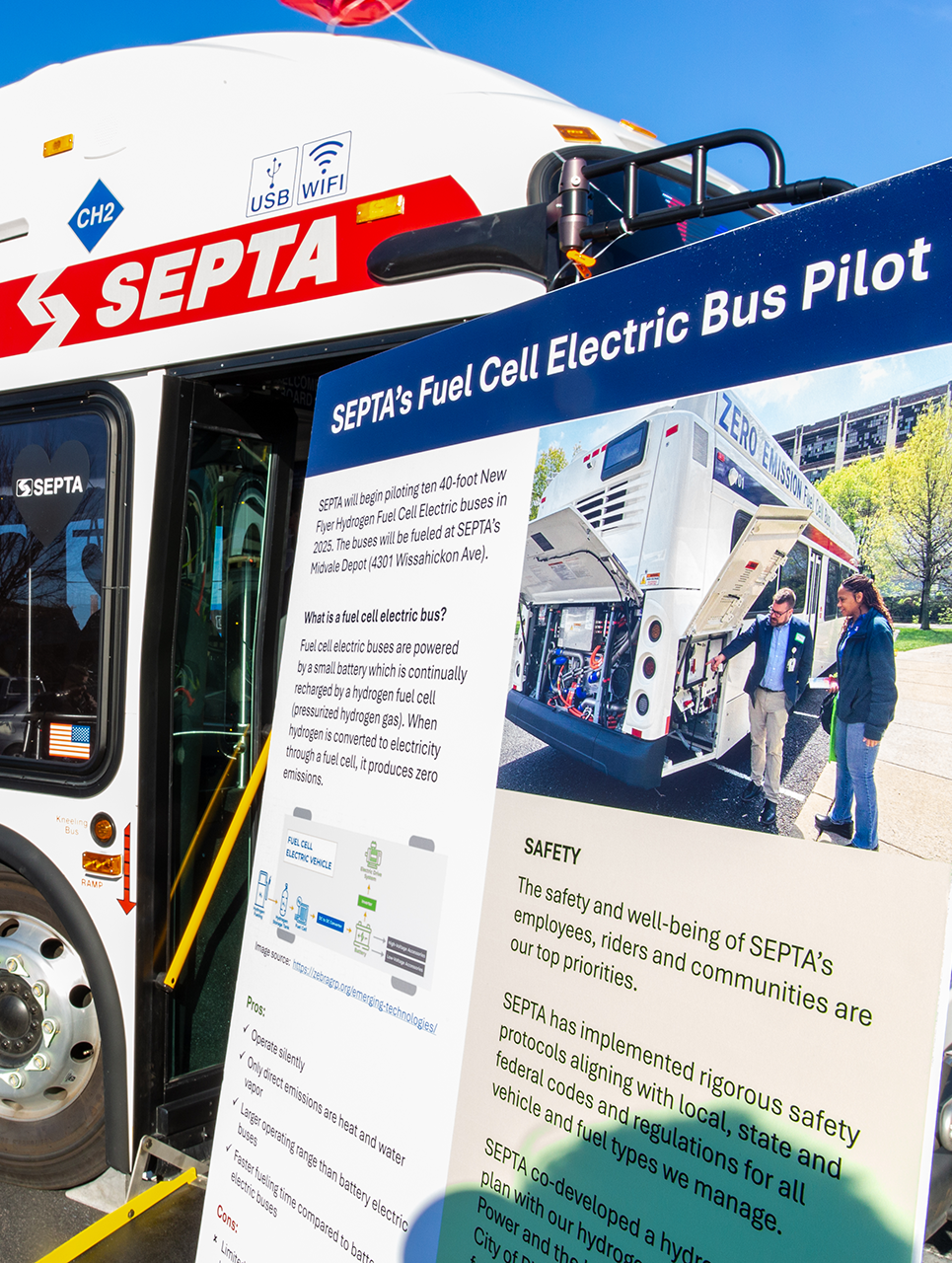Over the past year, Philadelphia has received over $21 million in federal funding to expand its electric vehicle charging network. EV ownership has boomed in the city — the number of registrations increased from 475 in 2018 to 5,870 in 2023, according to PennDOT — but there are too few charging stations to meet demand.
Northwest Philadelphia resident Karen Kaminsky recently installed a curbside charger on her property for her Chevy Bolt. Before that, she relied on public charging stations and says she often had to wait in line in the middle of a parking lot for her turn.
“Just finding the time and the availability to charge was the biggest issue,” Kaminsky says, adding that her private charger is much more convenient and cost-effective.

With the help of the Bipartisan Infrastructure Law, the City aims to install EV chargers in underserved neighborhoods, plus a charging hub at the Philadelphia International Airport. These plans are likely already under contract, according to a February 6 email from Zachary Appleby, PennDOT’s deputy communications director. The City also has plans to add 200 charging ports in City- and Philadelphia Parking Authority-owned lots.
Additionally, the legislation funds a training program for EV supplies and equipment workers called Plug In Philly, a partnership between the City and International Brotherhood of Electrical Workers Local 98 to expand the industry’s clean jobs workforce.
Yet the future of these projects is now uncertain after the Trump administration, which shows a continued hostility toward climate-focused initiatives, froze and then unfroze federal spending on grants.
The Trump administration’s attempt to freeze or rescind funding to build out the nation’s EV infrastructure is part of a larger, unconstitutional power grab.”
— Mary Gay Scanlon, United States House of Representatives
Trump specifically targeted the Inflation Reduction Act (IRA) of 2022 and the Bipartisan Infrastructure Law (BIL) through an executive order to “immediately pause the disbursement of funds … for electric vehicle charging stations made available through the National Electric Vehicle Infrastructure Formula Program and the Charging and Fueling Infrastructure Discretionary Grant Program.” The programs named are key sources of funding for Philadelphia’s EV charging infrastructure. It is unclear whether the reversal of Trump’s federal spending freeze applies to the funding of IRA and BIL projects.
The grants were awarded in three rounds, and last-round projects are not yet under contract, Appleby told Grid. For Philadelphia, that means the federal government can decide to scrap the plan for those 200 chargers. Moreover, Appleby says that funds have likely not been disbursed yet, leaving even the contracted projects in limbo.
The Federal Highway Administration (FHWA) released a memo on February 6 announcing an overhaul of the submission and approval process for the National Electric Vehicle Infrastructure (NEVI) program, subsequently suspending the approval of states’ infrastructure implementation plans for all fiscal years.
The NEVI program was created under the BIL to expand the nation’s network of EV chargers along its highways.
“Existing obligations will be allowed in order to not disrupt current financial commitments,” according to the memo, but states won’t receive money for projects previously approved but not yet funded.
In a statement, U.S. Congresswoman Mary Gay Scanlon, whose district includes South Philadelphia, Delaware County and the Mainline suburbs, calls the attempts to block NEVI funding “short-sighted, illegal and out of step with reality.”
Scanlon was one of five Pennsylvania politicians who announced the grant that was meant to fund the charging stations at the airport and in underserved neighborhoods.
“The Trump administration’s attempt to freeze or rescind funding to build out the nation’s EV infrastructure is part of a larger, unconstitutional power grab,” Scanlon says. “Congress authorized and funded the Bipartisan Infrastructure Law, including the national EV charging program, in order to ensure a smooth transition to a more sustainable transportation future.”

According to the commonwealth’s 2024 plan for EV infrastructure deployment, Pennsylvania had anticipated receiving $171.5 million in NEVI funding over five years. It is not clear how much of that money is already in state coffers.
Appleby told Grid on February 10 that PennDOT is evaluating whether and how the memo will impact both the 91 NEVI projects under contract and future plans.
The executive director of Delaware Valley Regional Planning Commission (DVRPC), Ariella Maron, said in a statement that the agency is waiting for “clarification on the impact of the recent executive orders and memos” and “guidance from FHWA and the departments of transportation.”
DVRPC’s Philadelphia Metropolitan Statistical Area Priority Climate Action Plan advises municipalities to transition fleets to EVs and install public charging infrastructure in order to meet regional climate goals.
Expanding Philadelphia’s charging network is a component of reducing private vehicular emissions as the City works toward carbon neutrality by 2050, as outlined in its Climate Action Playbook.



 This special section is a part of Every Voice, Every Vote, a collaborative project managed by The Lenfest Institute for Journalism. The William Penn Foundation provides lead support for Every Voice, Every Vote in 2024 and 2025 with additional funding from The Lenfest Institute for Journalism, Comcast NBC Universal, The John S. and James L. Knight Foundation, Henry L. Kimelman Family Foundation, Judy and Peter Leone, Arctos Foundation, Wyncote Foundation, 25th Century Foundation, Dolfinger-McMahon Foundation, and Philadelphia Health Partnership. To learn more about the project and view a full list of supporters, visit
This special section is a part of Every Voice, Every Vote, a collaborative project managed by The Lenfest Institute for Journalism. The William Penn Foundation provides lead support for Every Voice, Every Vote in 2024 and 2025 with additional funding from The Lenfest Institute for Journalism, Comcast NBC Universal, The John S. and James L. Knight Foundation, Henry L. Kimelman Family Foundation, Judy and Peter Leone, Arctos Foundation, Wyncote Foundation, 25th Century Foundation, Dolfinger-McMahon Foundation, and Philadelphia Health Partnership. To learn more about the project and view a full list of supporters, visit 





